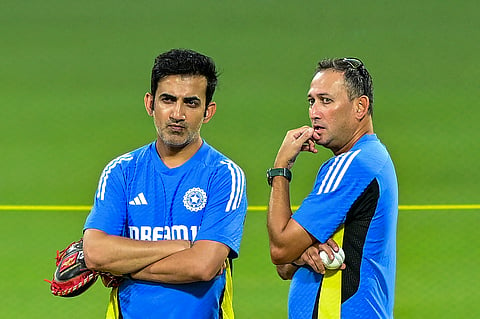

By the time the sun goes down in the Arabian Sea on Saturday, India will have a new Test captain. In fact, it might actually happen long before the people of Mumbai swarm the Marine drive to watch the sunset with the senior men’s selection committee, led by Ajit Agarkar, set to meet earlier in the day at the BCCI headquarters to discuss, debate and pick the squad and the new skipper for the five-Test series in England.
Of course, there will a press conference where Agarkar name the captain and the squad. There seem to be a consensus that Shubman Gill is the front-runner and will be, in all likelihood, handed over the reins of the most important on-field job in Indian cricket. The names of Jasprit Bumrah, Rishabh Pant and KL Rahul are also being murmured, but considering the fact that head coach Gautam Gambhir and Agarkar will be looking for stability at the helm and long-term options, Gill could well be on top of the list.
If that happens, it will mark the beginning of a new era in Indian cricket, just like it did ten years ago when Virat Kohli took over the Test captaincy from MS Dhoni. The difference, however, is that when Kohli took charge in Australia as Test captain, he had already made a mark with the bat in India, Australia and South Africa. While he did have one bad series in England, it was always going to be a matter of time.
With Gill, that is not necessarily the case. Just two matches ago, the Punjab batter was dropped in Melbourne after a poor run throughout the series. Even in Sydney, he, sort of, had soft dismissals at crucial moments which opened the door for a collapse. His overseas record is mediocre to say the least.
That being said, there is no question that he will be leading India in multiple formats down the line. The question here is whether he is ready to take up the job, which will put him at the front and centre of Indian cricket. There will be expectation to stamp his authority as a match-winner with the bat too. Only time, and Gill, can tell. If he gets the job, Gill, in his very first assignment, will be up against Bazballing England in their own backyard. It will be a challenge, to not just score runs, but also make sure India have the XI and tactics to take 20 wickets every game.
That will be the other key talking points in the meeting on Saturday. Is Mohammed Shami fully fit to deliver prolonged spells? Will Karun Nair and B Sai Sudharsan walk into the playing XI — they are likely to make it to the squad especially after Rohit Sharma and Kohli’s retirement. What will the pace attack, which is likely to feature Bumrah, Mohammed Siraj and Prasidh Krishna for starters, look like? Who will bat at the coveted No 4 position — one that has provided stability for Indian cricket over three decades from the time Sachin Tendulkar walked out in the spot against Australia in 1992?
For now, some of the questions at least will be answered when Agarkar addresses the media on Saturday afternoon. No matter what decisions they take, who they appoint, the next couple of years could be have its share of ups and downs for Indian cricket, especially in the longest format. For the team would be in transition and the new captain, and the next-gen stars, will face a challenge, not just in winning matches but also taking the legacy of Indian cricket forward. Which is why, the decisions made tomorrow will define how the next decade goes for Indian cricket.